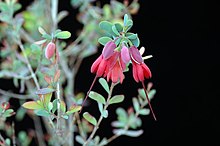Homoranthus zeteticorum is a flowering plant in the family Myrtaceae and is endemic to a small area in central Queensland. It is a tall shrub with axehead-shaped leaves and pendulous flowers with darker styles.
| Homoranthus zeteticorum | |
|---|---|

| |
| Homoranthus zeteticorum in the ANBG | |
| Scientific classification | |
| Kingdom: | Plantae |
| Clade: | Tracheophytes |
| Clade: | Angiosperms |
| Clade: | Eudicots |
| Clade: | Rosids |
| Order: | Myrtales |
| Family: | Myrtaceae |
| Genus: | Homoranthus |
| Species: | H. zeteticorum
|
| Binomial name | |
| Homoranthus zeteticorum | |

| |
| Occurrence data from AVH | |


Description
editHomoranthus zeteticorum is an upright shrub, the leaves are arranged opposite on a short petiole. The flowers are red, sepals red, 3–4 mm (0.12–0.16 in) long and the styles black and 22–30 mm (0.87–1.18 in) long. Flowering occurs sporadically throughout the year and the fruit is a one-seeded nut.[2]
Taxonomy and naming
editHomoranthus zeteticorum was first formally described in 1991 by Lyndley Craven and Sandra Raelene Jones and the description was published in Australian Systematic Botany.[3][4] The specific epithet (zeteticorum) is from the Greek zetetikos, meaning "disposed to research", latinised and given the genitive plural form, meaning "in honour of persons who, for their enjoyment, explore natural vegetation".[5][6]
Distribution and habitat
editThis homoranthus grows in shrubby woodland and heath on shallow, sandy soils derived from sandstone. It is only known from the Salvator Rosa section of Carnarvon National Park where it grows on Homoranthus Hill.[2][7][8]
Conservation status
editHomoranthus zeteticorum is considered a rare species with a restricted distribution. ROTAP conservation code 2RC-, Briggs and Leigh (1996).[2]
References
edit- ^ "Homoranthus zeteticorum". Australian Plant Census. Retrieved 25 November 2021.
- ^ a b c Copeland, Lachlan M.; Craven, Lyn A.; Bruhl, Jeremy J. (2011). "A taxonomic review of Homoranthus (Myrtaceae: Chamelaucieae)". Australian Systematic Botany. 24 (6): 351. doi:10.1071/SB11015.
- ^ "Homoranthus zeteticorum". APNI. Retrieved 25 August 2018.
- ^ Craven, Lyndley A.; Jones, S R. (1991). "A taxonomic review of Homoranthus and two new species of Darwinia (both Myrtaceae, Chamelaucieae)". Australian Systematic Botany. 4 (3): 513. doi:10.1071/SB9910513. Retrieved 19 August 2018.
- ^ Francis Aubie Sharr (2019). Western Australian Plant Names and their Meanings. Kardinya, Western Australia: Four Gables Press. p. 343. ISBN 9780958034180.
- ^ Brophy, Joseph J.; Craven, Lyndley A.; Doran, John C. (2013). Melaleucas : their botany, essential oils and uses. Canberra: Australian Centre for International Agricultural Research. p. 393. ISBN 9781922137517.
- ^ Copeland, Lachlan M.; Craven, Lyn A.; Bruhl, Jeremy J. (2011). "A taxonomic review of Homoranthus (Myrtaceae:Chamelaucieae)". Australian Systematic Botany. 24 (6): 363–364. doi:10.1071/SB11015.
- ^ "Homoranthus zeteticorum". Queensland Parks & Forests. Department of Environment and Science. Retrieved 26 November 2021.